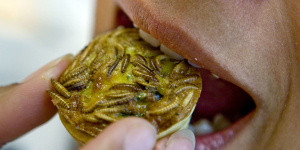Among the possible responses to food sufficiency problems for humans and animals, the Food and Agriculture Organization of the United Nations (FAO) recommends in its report “Edible Insects” to consider the breeding of insects in large scale. The insect-based diet (entomophagy) could become widespread in the coming decades. Indeed, according to FAO, it is already almost 2.5 billion people who regularly eat insects in the world. In Europe, the idea of developing an industrial production of edible insects caught on.

The Functional and Evolutionary Entomology Unit is interested also in this research theme. A synthesis of scientific knowledge on entomophagy conducted on behalf of ANSES, highlighted the lack of available scientific data on topics such as the environmental impact of the production of insects compared to other protein sources (including topics of ecological footprint and energy costs) and the nutritional value of different species of insects and insect products. This finding also applies as regards the specific dangers related to insects and safety in consuming countries. This study has highlighted the need for research in order to allow a full assessment of the health risks associated with consumption of insects.
